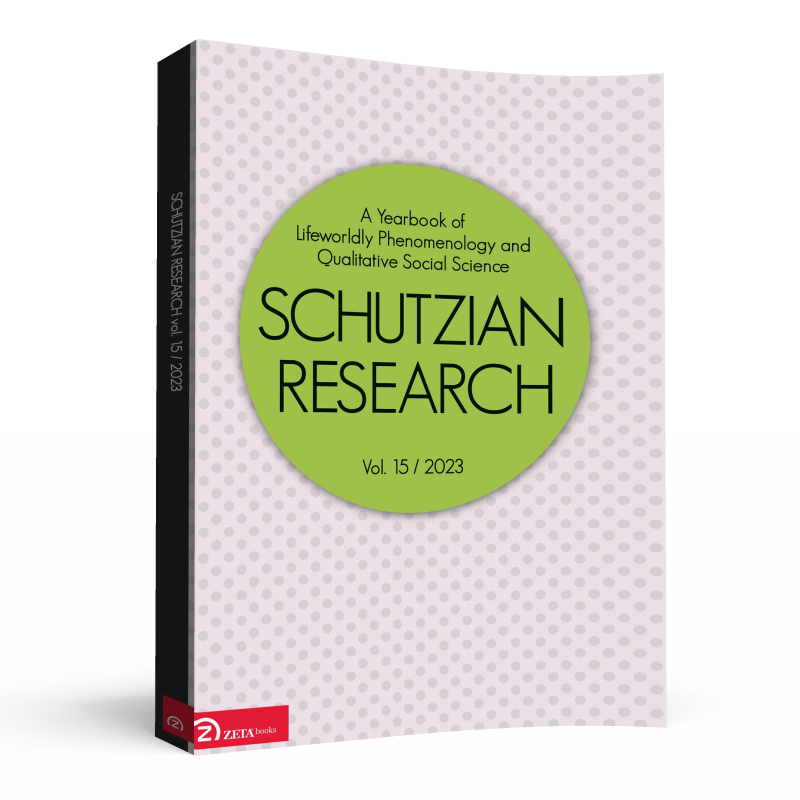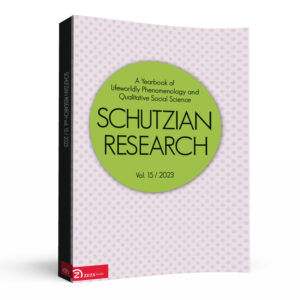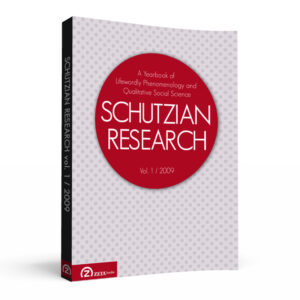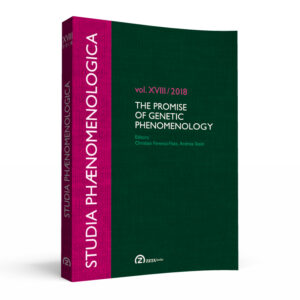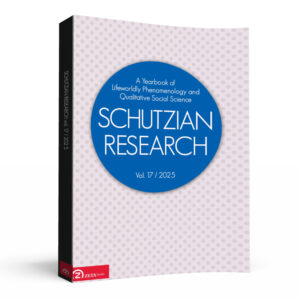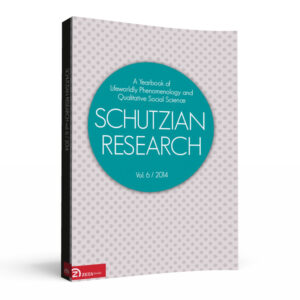Schutzian Research, Volume 15 / 2023
TABLE OF CONTENTS
Michael BARBER, Introduction
Abstract: This volume of Schutzian Research resulted from the sixth biennial meeting of The International Alfred Schutz Circle for Phenomenology and Interpretive Social Scienc which was held in Porto Alegre, Brazil, on May 11-13, 2023, under the leadership of Hermilio Santos at the PUCRS. In connection with these biennial conferences, the Board of Directors of the Schutz Circle issues a call for papers for the Ilse Schutz Prize, and this call for papers is directed to those who are still finishing their graduate studies or who are not yet tenured in the institutions to which they belong.
Wanting ZHANG, Structures of the Digitalized Life‑World: An Exploration of Alfred Schutz’s Life‑World Theory in the Age of Digitalization
Abstract: In this article, I argue that current information and communication technology with the outcome of deep digitalization has been so profoundly integrated into everyday life that Schutz’s primary, universalistic description of the life-world which underplays the role of technology necessarily leaves a huge range of everyday experiences insufficiently discussed. Taking Schutz’s phenomenological observation as a starting point, I intend to examine the spatial, temporal, and social structures of the digitalized life-world and its meaning for the praxis of social sciences. Standing by the world openness as human nature and technology as the very source of the dynamics of human-world-relation, I argue Schutz’s universalistic intended life-world analysis needs to be historicized ceaselessly to stay attuned to the most everyday reality.
Dániel HAVRANCSIK, A Schutzian Bridge to Radical Constructivism
Abstract: It is well known that the movement of social constructionism rests on foundations laid by Alfred Schutz, but the relationship between his thought and epistemological constructivism has scarcely been addressed. Scholars devoted to the investigation of Schutz’s oeuvre paid little systematic attention to the specific constructivist character of his epistemological position, and proponents of the modern form of epistemological constructivism, second order cyberneticians and radical constructivists have failed to recognize Schutz’s relevance for their project. This paper attempts to show that Schutz’s epistemologically oriented phenomenological-pragmatic theory is compatible with the core tenets of epistemological constructivism and proposes to erect a bridge between Schutzian minded interpretive sociology and constructivism, where arguments could travel both ways. After a brief introduction to Schutz’s theory and Ernst von Glasersfeld’s radical constructivism, I try to point out some topics, where intellectual transfer would be beneficial for both camps.
Giulia SALZANO, Phenomenological Sociology on Stage: Reading Theatre through Alfred Schütz’s Categories
Abstract: This article proposes an interpretation of the theatrical experience mobilising Alfred Schütz’s theoretical framework and conceptual tools. The text presents the accounts of some theatre operators (actors, directors, students in training, both amateurs and professionals) from whose words it is possible to seize, without forcing or over-interpretate them, the expendability, the relevance and the topicality of the Schützian thought and lexicon. Such an approach allows not only to question and investigate the phenomenological status of the artistic world but also to sketch a “dramatization” of the phenomenology of the social world proposed by the Viennese intellectual. In this perspective the text focuses on the processes of typification, sedimentation and reorganization of the stock of knowledge, on the structuring of the socio-spatio-temporal sphere and on the negotiation between expressed and interpreted meaning, in order to analyse how they work in the theatrical experience.
Alejandro LAREGINA, Intersubjectivity and Professional Care: Elements for a Possible Phenomenology of Aquatic Rescue
Abstract: This article provides a phenomenological description of aquatic rescue within the framework of interdisciplinary and reflective social phenomenology in the Schutzian tradition. Aquatic rescue is a professional discipline involving the care of others, such as bathers, in various environments: beaches, swimming pools, rivers, lakes, lagoons and other water bodies. Care implies not only intervention before the emergency and the need for corresponding assistance, but the anticipation and prevention of possible and/or imminent danger as well. One of the central objectives of this work is to clarify how the social relationship of care works from a Schutzian perspective, that is, the relationship involving the embodied intersubjectivity of a shared environment, as well as what is communicated and expressed between lifesavers and between lifesavers and bathers. This characterization requires paying attention to the internal perspective of the participants involved: bathers or victims and lifeguards, the extent of their knowledge and what they have experienced in time and space, along with their skills, subjective meanings involved, and the “because motives“ and “in order to motives” of their actions in the context of their projects.
Raul F. PREZAS, Paul R. SHOCKLEY, A Stranger in One’s Own Community: Iterations of Ritual Desecration and Reverse Ritual Purification
Abstract: In the Schutzian tradition, Berger and Luckmann expand upon the concept of the stranger and discuss the social reality of ritual purification as a coping strategy for reality-maintaining procedures and mental hygiene whereby individuals reconcile their encounter with a foreigner or stranger and their official reality. Using examples from the trans, gender non-conforming community (TGNC), the central question of this paper is: What about those considered a stranger in their home community? Given the hardships that TGNC people have encountered and continue to face, “unsuccessful socialization” does not offer the best account of their challenges, obstacles, and sufferings when marginalized by others. Advancing Schutzian research, we offer two terms that can be applied to the idea of the stranger: ritual desecration and reverse ritual purification. Using a dialectical framework, a social and interpersonal conflict occurs between ritual purification and ritual desecration. Consequently, two personal iterations emerge: those who experience ritual desecration by remaining in their home environment and those who migrate to another community for the possibility of acceptance and belonging, hence, reverse ritual purification. The iterations between ritual purification, ritual desecration, and reverse ritual purification lead to incremental changes and hardships, potentially creating a new social reality.
ISSN: 2067-0621 (paperback)
ISSN: 2248-1907 (electronic)

